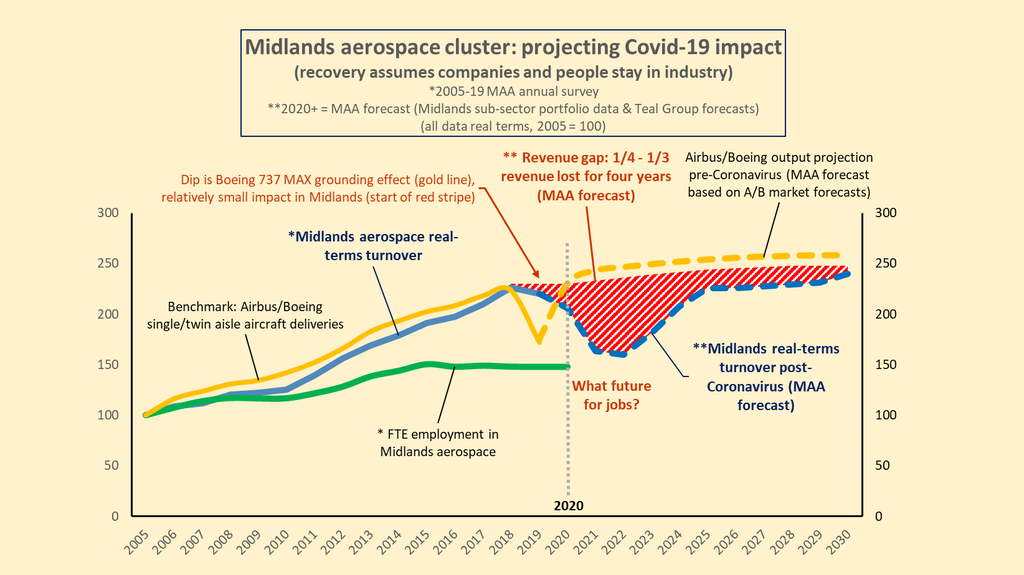Five-point plan to get the Midlands supply chain through the downturn
Survey closed 5 June 2020
The MAA is now conducting a short on-line survey to consult on our 5-point plan, detailed below, to rescue and recover aerospace supply chains in the Midlands.
If your organisation is part of -- or connected to -- the aerospace sector, please help us complete the development of the plan by filling out our survey. It should take 10-20 minutes to answer depending on the level of detail you wish to provide. More than one person working for a company can complete the survey
In conjunction with the insight we already have through our MAA working groups, which are made up of regional aerospace experts, we will be using the survey feedback to support us with maturing and finalising the solutions we’ve developed.
You can access the survey here.
The MAA five-point plan was launched on 6 May 2020
With air travel down 90% and barely a day passing between new announcements of airlines around the world cancelling orders for new aircraft, huge cuts to aircraft delivery rates and devastating redundancy plans, the aerospace industry is preparing for what could be the largest market meltdown in its history.
These shockwaves are now coursing through the aerospace industry in the Midlands region. The chart below shows how deep the impacts are forecast to be. Companies that survive these challenging times could take years to return to growth.

Early this year, we predicted stormy times might be on the horizon after years of uninterrupted growth in the aerospace industry during which Airbus and Boeing doubled aircraft output to meet the needs of the world’s airlines. The revenues and productivity of aerospace companies in the Midlands, one of the worlds’ largest aerospace clusters, grew in parallel.
Problems started to hit some aerospace suppliers in 2019, when Boeing began experiencing severe issues with the design of its new, 737 MAX aircraft, and was forced to suspend production. A number of aerospace companies in the Midlands manufacturing supercluster made components for the aircraft or its engines and were already experiencing impacts when the effects of COVID-19 began to take hold.
With commercial aviation and aerospace now in crisis, it’s not just the airlines and well-known aircraft and aero-engine makers that need support. The aerospace supply chain, which forms the foundation for the whole industry, is vital to the UK economy, providing hundreds of thousands of jobs directly and indirectly, and has unique capabilities. In the Midlands, it is second in size only to the car industry. We must work together to make sure the aerospace supply chain pulls through this crisis and returns to healthy growth in the years to come.
The Midlands Aerospace Alliance is working at pace on a five-point rescue and recovery plan, based on insight gathered through the strong connections we have across the aerospace industry in our region, nationally and internationally, and with government at all levels. Through research and consultation with industry experts, we have established five pillars that will enable supply chain companies in our region to get through the downturn and recover as soon as possible.
The five point plan
1. People: Ensuring safe and productive workplaces
- For businesses to operate right now, it’s paramount that workplaces are safe and employees feel they have trust in their environment.
- The concept of a ‘workplace’ is also changing. Companies need to be creative and resourceful in order to remain productive, considering flexible working, retraining and redeploying talented people in particular.
- We will be promoting best practice to provide ideas and help ensure these new ways of working are as effective as possible. Rapid learning will be crucial.
2. Finance: ‘Re-launch’ support for supply chain companies
- Cash flow is essential to the survival of aerospace suppliers. Suppliers must be paid on time for products and services that have been agreed.
- Requests for ‘cost-downs’ by the prime aerospace companies must be fair and agreed in partnership rather than be demanded in a way that may cripple the supply chain.
- Some companies may also require direct financial support to see them through the downturn, possibly through long-term loans that are repayable based on sales (‘re-launch aid’).
- We will be talking to government at all levels about the support packages needed.
3. Supply chain: Developing a resilient supply network
- Aerospace supply chains are made up of tight networks of specialist companies and need to be more resilient than ever. To enable this, suppliers need much better visibility of future requirements so that they can forecast and plan their operations effectively.
- All aerospace customers need to work hand-in-hand with their suppliers to plan the careful scaling down of operations, when necessary, to leave them well prepared for ramping back up when the time comes. The best solutions are developed together and so communication must be two-way.
- It’s also vital that we share best practice and opportunities quickly across our network so that supply chain companies can support each other.
4. New business: Opportunity creation
- We need to work together to continue to promote the Midlands aerospace industry and our manufacturing supercluster, demonstrating our diverse and advanced capabilities to a global market.
- It’s never been more important to share collective market intelligence, especially to support companies in the lower tiers of the industry that do not have the capabilities to grow this knowledge in-house.
- Companies may need to look closely at diversification and unlocking opportunities in new markets. We will be supporting initiatives to build ‘short supply chains’ in the UK to serve other market sectors – building on the lessons of the 'ventilator challenge' which saw 40 Midlands aerospace companies make and deliver hundreds of thousands of parts for this sophisticated medical equipment in a matter of days.
- We will be developing a virtual business development toolbox to enable companies to open doors while travel and face-to-face meetings are restricted. These could transform the way we do business forever, making it much more efficient and cost-effective to create opportunities longer-term.
5. Innovation: Turning ideas into revenue
- The UK has always been at the forefront of innovation, based on the British culture of inventiveness. Engineering is one of our country’s – and our region’s -- greatest strengths. We need to unleash the innovative potential of our agile small companies -- and we need to do it fast.
- We need to keep investing in technologies that reduce the environmental impact of flying like additive manufacturing, aircraft electrification and fuel-efficient aero-engines.
- We want to help develop solutions that will give companies long-term competitive advantage and embed resilience, like exploiting aerospace innovations for customers in new market sectors.
Our survey
Our five-point rescue and recovery plan is in its advanced stages and, to ensure it best serves the industry, we are eager to hear the views of everyone who works for aerospace companies. In conjunction with the insight we already have through our MAA working groups, which are made up of regional aerospace experts, we will be using the survey feedback to support us with maturing and finalising solutions.
The survey is now live. Please help us complete the development of the plan by answering it, here.
The final five-point plan will be discussed with regional bodies like the West Midlands Combined Authority -- who we are already talking to closely -- and the Midlands Engine, as well as local bodies. It will also be fed into the UK national economic policy debate to make sure it is complementary with the industry-government Aerospace Growth Partnership, and at the same time it will be benchmarked against other leading aerospace regions through the European Aerospace Cluster Partnership.
Together, we can help Midlands aerospace companies survive these challenging times and continue contributing everything they do to the economy and our communities on their journey back to steady growth.
For further information contact: andrew.mair@midlandsaerospace.org.uk.
For media enquiries contact: loretta@milancreative.com






